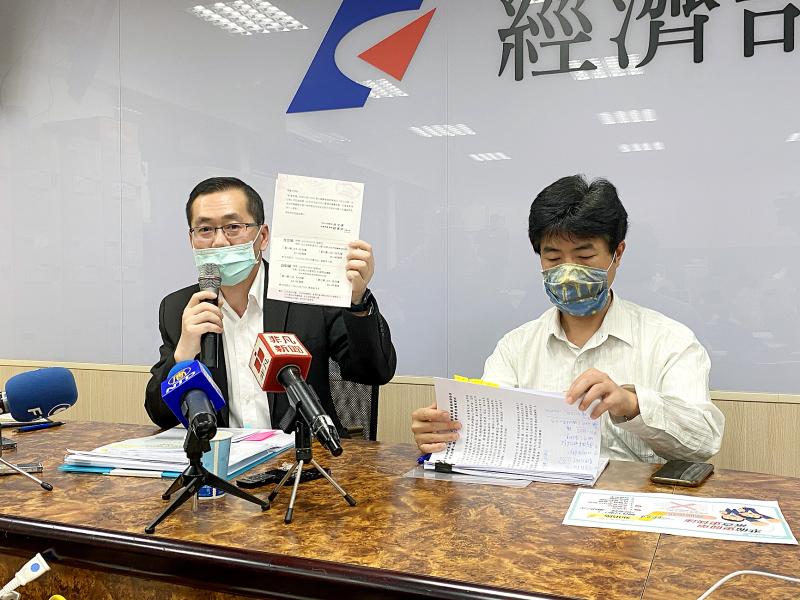The Industrial Development Bureau (IDB) has approved 756 of 1,224 applications from companies seeking government subsidies due to the effects of the COVID-19 pandemic, it said yesterday.
Of the approved applications, 280 are from base metal and machinery equipment makers, 188 are from consumer goods and chemical materials manufacturers, and 120 are from information and communication technology companies, IDB data showed.
The remaining applications are from businesses across various sectors, such as design, tourism and knowledge-based industries.

Photo: Huang Pei-chun, Taipei Times
“Applications are still pouring in and we are receiving an average of 100 applications per day,” IDB Deputy Director-General Yang Chih-ching (楊志清) said at a news briefing in Taipei.
Launched more than two weeks ago, the relief program is part of a wider economic stimulus package launched by the Ministry of Economic Affairs.
It is aimed at providing financial aid to businesses from the manufacturing and services sectors that are struggling with the effects of the pandemic.
Under the program, companies with a 50 percent annual decline in sales can receive wage subsidies of up to 40 percent per employee, to a maximum of NT$20,000 (US$667.78), as well as a one-time injection of working capital calculated based on NT$10,000 per employee.
“We have already handed out NT$734 million [in subsidies] to approved companies to help them pay April wages ... benefiting up to 33,957 employees,” Yang said, adding that the ministry plans to hand out another NT$1.12 billion this month and the next.
The ministry has allocated a total of NT$39.6 billion to fund the program as it seeks to subsidize wages of up to 660,000 employees.
Yang also refuted a previous suggestion from the ministry that it would lower the threshold for companies to qualify for the program by including firms that have posted a 30 percent annual decline in sales.
“After discussions with industry representatives, we have decided to maintain the 50 percent threshold while loosening certain criteria,” he said.
Under the new criteria, companies can show a 50 percent decline in sales by comparing with any monthly sales figures last year, instead of only monthly sales registered in January to June, he said.
In other news, the ministry yesterday approved an application from I-MEI Foods Co Ltd (義美食品) to take part in a government incentive program and invest NT$3 billion in a facility for recycling agricultural waste.
The company plans to set up a biomedical operations center equipped with smart production lines in Taoyuan’s Longtan District (龍潭區), the ministry said.
The ministry also approved an application from Winner Hydraulics Corp (武漢機械).
The maker of power packs and cartridge valves plans to invest NT$900 million expanding an existing plant in the Central Taiwan Science Park (中部科學園區), the ministry said.
Industrial panel maker Mildex Optical Inc (熒茂光學) plans to invest NT$100 million to relocate its core production from China to Taiwan and expand its existing plant in Kaohsiung, the ministry said.

In Italy’s storied gold-making hubs, jewelers are reworking their designs to trim gold content as they race to blunt the effect of record prices and appeal to shoppers watching their budgets. Gold prices hit a record high on Thursday, surging near US$5,600 an ounce, more than double a year ago as geopolitical concerns and jitters over trade pushed investors toward the safe-haven asset. The rally is putting undue pressure on small artisans as they face mounting demands from customers, including international brands, to produce cheaper items, from signature pieces to wedding rings, according to interviews with four independent jewelers in Italy’s main

Japanese Prime Minister Sanae Takaichi has talked up the benefits of a weaker yen in a campaign speech, adopting a tone at odds with her finance ministry, which has refused to rule out any options to counter excessive foreign exchange volatility. Takaichi later softened her stance, saying she did not have a preference for the yen’s direction. “People say the weak yen is bad right now, but for export industries, it’s a major opportunity,” Takaichi said on Saturday at a rally for Liberal Democratic Party candidate Daishiro Yamagiwa in Kanagawa Prefecture ahead of a snap election on Sunday. “Whether it’s selling food or

CONCERNS: Tech companies investing in AI businesses that purchase their products have raised questions among investors that they are artificially propping up demand Nvidia Corp chief executive officer Jensen Huang (黃仁勳) on Saturday said that the company would be participating in OpenAI’s latest funding round, describing it as potentially “the largest investment we’ve ever made.” “We will invest a great deal of money,” Huang told reporters while visiting Taipei. “I believe in OpenAI. The work that they do is incredible. They’re one of the most consequential companies of our time.” Huang did not say exactly how much Nvidia might contribute, but described the investment as “huge.” “Let Sam announce how much he’s going to raise — it’s for him to decide,” Huang said, referring to OpenAI

The global server market is expected to grow 12.8 percent annually this year, with artificial intelligence (AI) servers projected to account for 16.5 percent, driven by continued investment in AI infrastructure by major cloud service providers (CSPs), market researcher TrendForce Corp (集邦科技) said yesterday. Global AI server shipments this year are expected to increase 28 percent year-on-year to more than 2.7 million units, driven by sustained demand from CSPs and government sovereign cloud projects, TrendForce analyst Frank Kung (龔明德) told the Taipei Times. Demand for GPU-based AI servers, including Nvidia Corp’s GB and Vera Rubin rack systems, is expected to remain high,